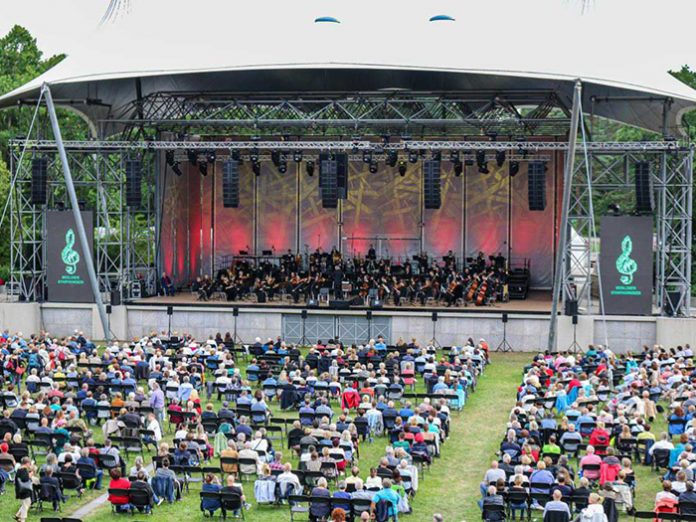
The unmistakable melodies of Ennio Morricone were heard in all their immersive splendour at a tribute concert in Berlin’s Wuhlheide, played by the Berlin Symphony Orchestra. LITT event-technik was responsible for the implementation of the L-ISA Immersive Hyperreal Sound-System, with the experienced hands of System Engineer, Ulf Oeckel and FOH Engineer, Holger Schwark manning an L-ISA system.
“I was honoured to plan one of the first L-ISA world tours with Mark Knopfler and bring it to the streets. In addition, I am a qualified L-ISA trainer,” explained Oeckel, who went on to describe the advantages of spatial audio technology for orchestral productions. “The clarity and transparency are much greater than can be achieved with a conventional stereo system. With every L-ISA production I notice that the audience unconsciously feels more comfortable and connects with the music in a natural way.”
In Berlin’s Wuhlheide, an L-ISA Wide scene design made up of seven identical hangs, each with nine Kara cabinets, provided this audiovisual coupling effect. For structural reasons and for reasons of audience occupancy – two thirds of the open-air stage was occupied – a lateral extension system was not required, with the sale of seats based on the L-ISA zone, so that the same high-quality audio was delivered to every listener in the covered area and its first tier.
“The concert in Wuhlheide was the first time our L-Acoustics portfolio was used for an L-ISA show,” LITT Managing Director, Rolf Henning reported. “The sound effect is incredible. In 2022, we will go on a big farewell tour with German rock band City. L-ISA is already firmly planned!”
For Oeckel, too, the trend towards L-ISA productions in the live area is continuing: “Every area of event technology has developed over the years – light, video, kinetics, audio control and processing. Yet the audio system technology, the individual components of which now contain a high level of pioneering technology, are still being relegated to the left and right of the stage and should, ideally, be almost invisible. With L-ISA, this way of thinking is finally changing, because now there is a practicable technology that is suitable for touring and is used when the focus is on acoustic performance.”
This means the prospects for the future are good, even if the effects of the pandemic are still causing Oeckel a headache, especially in the touring sector. “Big tours need a lot of planning in advance,” he concluded. “We have not yet survived the crisis here. Day-to-day events are increasingly taking place again and I hope that we will really pick up speed again in 2022.”





